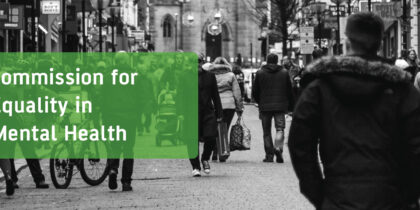Thea speaks to independent policy expert Tom Pollard about the fundamental issue of poverty, mental health and the benefits system. They discuss his recent research on how using food banks impacts people’s mental health, why he decided to retrain as a mental health social worker, and what is needed to truly address the vicious cycle of poverty and poor mental health.
Listen to the episode on Spotify or Apple Podcasts. The full transcript is available below.
Show notes
- Check out Tom’s research with the Independent Food Aid Network and the Joseph Rowntree Foundation, Pushed to the Edge: Poverty, Food Banks and Mental Health
- Download our briefing covering 10 actions government can take to reduce health disparities
- We’ve been highlighting the need for local councils and new Integrated Care Systems to address poverty in order to improve mental health
- Learn more about the impact of inequality on mental health through the Commission for Equality in Mental Health
- If you enjoyed this episode, please consider donating to enable us to produce more content like this.
Music by scottholmesmusic.com
Transcript
Alethea Joshi (AJ): Hello and welcome to Centre for Mental Health’s podcast, where we talk about a whole range of topics around mental health and social justice. I’m Thea Joshi, and this month I chatted with Tom Pollard, an independent policy expert who’s also one of our associates at the Centre. Tom has previously worked in social policy related to mental health, and then trained as a mental health social worker. He also writes and campaigns around benefits and employment support for people with mental health difficulties. I caught up with Tom to discuss the fundamental issue of poverty and mental health, the relationship between the two, and what we can do to truly make change happen.
AJ: Welcome, Tom, it’s great to have you on the podcast today. And obviously, this is the first time you’ve met. But your reputation very much precedes you as someone who is deeply passionate about equality and mental health, and particularly kind of in the realm of policy and the benefit system. So welcome.
Tom Pollard (TP): Thank you. It’s nice to be here.
AJ: So obviously, you’ve done a lot of work in the area of benefits, poverty, and back to work support and the intersections of these three with mental health. And obviously, we talk a lot at the Centre about the relationship between poverty and mental ill health. And actually, we’ll be releasing a briefing in the coming month on this very topic. I wonder if you could set out for us some of the key things that you feel need to change in order to tackle this vicious cycle of poverty and poor mental health?
TP: It’s a huge question. And I think what really struck me when I first started working on mental health at Mind was that people’s experience of mental health problems are so fundamentally shaped by their kind of material circumstances. And that if you’re living in poverty, in particular, that experience is so much harder, just the day to day struggle of trying to make ends meet, both makes it more likely that people will develop mental health problems, but also means that if you have kind of pre-existing mental health problems, your life is that much tougher. And I think we have come a long way in terms of awareness and understanding of mental health. And I think it’s great that more people feel able to speak out about their mental health problems. But I think what has been lacking in the debate is real recognition that actually, this is in large part about people’s personal circumstances and experiences. And that plays a huge role in shaping who becomes ill in the first place, and then what their experience of being ill is like. And I think there’s been maybe too much focus on, people just getting access to NHS care and support, as critical as that is, and not enough on kind of shaping the circumstances in which people live to try to reduce the number of people who become ill in the first place, and also improve the kind of day to day experience for people who are living with mental health problems.
AJ: And I would totally agree with that as well. I mean, we recently produced a briefing about tackling mental health disparities. And, you know, we’re very clear about, you’re totally right, anyone can experience a mental health problem. And that’s a really important message to hear, but that can’t be where the conversation stops, because that won’t address what what we’re seeing in society, which is that if you are, you know, struggling financially, or experiencing racism or not having good housing, you are more likely to struggle with your mental health, understandably, and so we have to kind of progress this narrative to say, actually, inequalities do affect people’s mental health. And as you say, we can’t just look at the NHS, because our chief exec Sarah’s said this many times, but you know, we can put all the money we want into the NHS, but if we’re not simultaneously addressing the other parts of the system, like the benefit system, like housing, like local government, then we’re not going to actually see that change that we want to.
TP: Yeah, I think that’s right. And I think, you know, I guess we’ll come on to talk about this. But now working part of my time in the NHS, you have a really strong sense that there’s, there’s a kind of hard limit, I guess, on how much you can do to help people in the short term. You know, and you can try to help improve them material circumstances, and that kind of day to day life. But you’re kind of, you know, running up a down escalator a lot of the time, that people are, you know, disadvantaged and facing, whether it’s kind of overt discrimination, or just kind of very adverse social and economic circumstances. And it does make you realise the limitations on what you can do with within a health setting, and that often it feels like you’re, to some extent, kind of patching people up and sending them on their way, rather than addressing the fundamentals, because a lot of those fundamentals are kind of beyond your control.
AJ: Yeah, thanks. That’s really helpful insight. On a related subject, I know you’ve recently done some work with the Joseph Rowntree Foundation and the Independent Food Aid Network on food banks and poverty and mental health. And I’d love to hear a bit more about this.
TP: So I started talking to IFAN, the Independent Food Aid Network sort of late last year, around the time that the government was planning to take away the £20 uplift to Universal Credit. So they increased Universal Credit by £20 a week and kind of recognition of the difficulties people were facing during the pandemic, but were planning to take that away. And, you know, we knew already that people were struggling even with that uplift, and so I think I felt that it was gonna be quite a critical moment and that kind of, I guess, just documenting, in the first instance, the impact of that on people and highlighting how, you know, the experience of having to turn to kind of charity to be able to feed your family, that first of all if people were in those circumstances, that was likely to be having quite a profound impact on their mental health, but the actual experience of having to go and seek that support would also likely, you know, have a heavy impact on people’s mental health.
So, the idea of the work was essentially to go into food banks, one in London and one out in Kent, and to just talk to people in quite a lot of detail about what has led them to need support from food banks, but more importantly, kind of how that had impacted on them personally. And I think coming at that, as both a kind of social policy researcher but also someone who works in services now, I felt able to have maybe a deeper conversation about people’s mental health and explore in a bit more detail how that was impacting on their mental health than perhaps I would have been able to, prior to having worked in services, and I guess, having the competence to be able to kind of broach quite difficult subjects around people feeling suicidal as a result of their circumstances.
And so yeah, I spoke to a whole range of people, whether it was kind of people living by themselves, people in families, sometimes speaking to couples together about what had been going on, and then produced this report with with IFAN and with Joseph Rowntree Foundation to kind of, I guess, highlight the key themes that I heard, and a lot of that was around, you know, just the kind of cold hard facts of people not getting enough from the benefits system to make ends meet. A lot of it was around, people just feeling like, the day to day struggle of trying to make ends meet, and of kind of dealing with, I guess, a lot of the admin and hassle of being in poverty. And, you know, the, the additional burden that places on people, was making it so hard for them to see a way forward. I think for me, that was kind of the most profound message from what I heard was that, actually, it’s really hard work being poor, and especially if you’re trying to support a family, you know, both the kind of mental strain that puts on people of feeling like they’re struggling to provide, but also just the kind of practical day to day, having to having to budget so carefully and kind of make sure that every penny was being used efficiently and worrying about every decision that has a kind of financial implication was, you know, taking up a lot of people’s time, but also just taking up a huge amount of headspace and causing a huge amount of stress. And that actually, if people had a bit more to start off with and a kind of more secure baseline, they’d be much better placed, then to be able to work their way out of their circumstances, if you like.
AJ: Yeah, thanks for that. And I think it kind of leads me to ask what what needs to happen for that not to be such a challenging, stressful process for people? Is it that people simply need a higher baseline of benefits, simply more money each week, each month? Is it that the admin behind it just makes it so difficult to manage? I’m sure it’s very complex. But could you talk us through a few of those things?
TP: Yeah it’s a funny one because on the one hand it obviously is a complex issue. And people’s circumstances are very different, and they’re facing different challenges. But it feels simplistic and almost a bit crass to say it, but at the heart of it, it’s not as complex a problem as it might appear, I mean I do genuinely think that a lot of this is fixed if people have a baseline level of income that is enough to make their ends meet. And I think we’ve got to position where a lot of the debate is about whether benefits should go up a little bit or stay where they are. But it’s not really pegged to the reality of what people need. And actually, what’s happened over the last decade is that benefits lost value, you know, in real terms, for quite a number of years, the rate of benefits were increased by each year was frozen. And so we’re at a place now where benefits are worth the same in real terms as they were back in kind of the early 1990s. And so it’s kind of a quite significant low. And so we get stuck now in a debate about well, how much do benefits need to go up by in order to keep pace with rising prices. But actually the baseline we’re starting from is so low that that people were struggling before the kind of cost of living (in inverted commas) hit, and before inflation became so high.
So I just feel like the conversation around this is often very unrealistic. Like, it’s not grounded in the reality of what people actually need. If people weren’t struggling day to day to meet their basic costs, and actually most members of the public agree that benefits should cover people’s basic costs, but the disagreement is around whether whether they currently do. And there’s a perception out there that people are kind of squandering the money they have. But all my experience in the space suggests that actually, you know, people are doing their best to get by on a very, very low income. And that, rather than kind of trapping people in some kind of dependency, having a level of income, that means people can get by frees people up to be able to kind of focus on well, you know, how do they want to move their life forward, rather than being trapped in the cycle of constantly just about making ends meet the whole time.
AJ: Yeah. And I mean, when you describe it like that, it’s so obvious, isn’t it, the way that that would impact someone’s mental health. As you say, there’s a huge amount of baggage around that debate. Thank you for shedding light on that though, Tom, that’s really helpful. And I guess I also wanted to ask you about, because obviously, you were in the mental health and the social policy space for many years, and recently retrained as a mental health social worker through the Think Ahead programme. And I guess I just wanted to ask you, what motivated you to do that?
TP: Yeah, so it was a few things. I mean, if I’m completely honest, one of the things was just, I spent a long time working at Mind on issues around, particularly around our benefits and the Social Security system and employment and the intersection of that with mental health. I was then asked to go on secondment to DWP to advise there on mental health. And I spent 18 months in that role, which was interesting, but ultimately very frustrating. And I came out of that, not really being sure exactly what to do next. I mean, I didn’t want to just go back into sort of banging my head against the same wall of trying to influence what I felt was quite a kind of intransigent and stuck department in terms of seriously think about how you address the sort of issues that I was working on. So part of it was kind of, you know, wanting to take a slightly different path.
And part of it was feeling that, you know, I’d worked on mental health for a long time, but actually not had a huge amount of exposure to the reality of day to day frontline mental health services, you know, other rather than having used mental health services myself, when I was younger. And I felt like it was a big gap for me that you can kind of know about a lot of the issues from a policy perspective, and you could talk about them a lot. And you can kind of know the technical details, but it’s very different, being immersed in it day to day. And I’ve said before that it kind of felt like it felt a bit like going from kind of seeing things in black and white to doing things in colour. That was just a really fundamental difference when you’re face to face with these things day to day. And you’re much more able to see the reality of how all these different issues that you think and talk about in a policy context, kind of interweave in someone’s actual day to day life. So some of that’s kind of hard to pin down and define. But I think also there was, you know, it’s been really useful to get a clearer sense of how different services work together or don’t work very well together. And, you know, the kind of intersection between health and social care. And, you know, working as a social worker within the NHS is quite an interesting role, because you kind of straddle that divide. But yeah, it’s just, it’s been a really interesting and kind of valuable journey for me to kind of move from thinking about these things in the abstract to being kind of very up close and personal with it. And I think it’s, it’s given me kind of a perspective, that’s helpful then when I return to thinking about these kind of social policy issues, because I do have that kind of firsthand experience of helping people to work through these issues on a day to day basis.
AJ: Yeah, that’s a really helpful perspective. And I guess, I mean, for those of us who don’t work in mental health services, could you talk us through what you do on a day to day basis, what that kind of maybe looks like?
TP: Yeah, so I’ve actually ended up at the moment working in a crisis team a couple of days a week, which is quite different from working in a community team where you have have a group of people that you’re allocated to work with, and you support them over a long period of time and you sort of help them to work through a whole range of issues they’re facing. The crisis team is much more focused on kind of a short term intervention where people are at significant risk either because they’re feeling suicidal or because maybe they’re experiencing a kind of psychotic episode or something that that puts them or, or maybe other people at risk in some way. And it’s quite intensive contact, but it’s contact that’s shared across a whole team. So I’ll go in on any given day, and I’ll be allocated to either go and assess someone to see whether the crisis team is kind of appropriate for them, and whether they want to work with the crisis team. Or to visit someone who’s currently supported by the team, and we’re seeing them either every day or every other day. And a lot of it is focused on kind of trying to monitor and manage risk. But I also feel that coming at it from a kind of social work perspective, and having gone through that social work training, does give me the ability to, to look a bit more broadly at what’s going on in their life, and try to think about other services that might be able to help them to address what’s going on for them. Because often when someone’s experiencing a crisis, it is often triggered by things like financial issues they’re experiencing, or issues within their family and relationships or issues within their work. You know, it’s not often that someone kind of just falls into a mental health crisis for no reason at all, it often is about the kind of economic and social circumstances. And although you can’t fix that within a short period of time that the crisis team works with someone, you can think about, what are other sources of support that might help this person? So for example, just in the last year or so this new scheme has come in around debt and mental health, where if someone’s experiencing mental health crisis, they can get what’s called ‘breathing space’ to kind of have some relief from the debt that they face. And the companies involved, or the services, the agencies involved who they owe money to have to kind of give them a period of time where they’re not being hassled for a repayment.
AJ: So obviously, you know, you’ve worked in the kind of the policy settings, as you said, and you’ve also worked, obviously, on the ground, so to speak, on the front line. And I guess, as we’ve alluded to, before, there’s this kind of, can feel like a sort of disconnect between the high level policy and legislative conversations, and then also actually how that’s experienced by people on the ground and people working in services with people. How do you make sense of that? And do you think that kind of having almost had a foot in both camps has helped?
TP: Yeah, it helpful in terms of my, I guess, my perspective, my understanding. I think it does make you realise that, you know, it’s very difficult to kind of make those things align, I guess, in some ways, because I think a lot of us working around mental health now believe that there needs to be more focus on addressing the kind of social and economic circumstances that often lead people to develop mental health problems and have a difficult time when they have mental health problems. And to think more about prevention and kind of public health perspective. But actually transitioning from the current day to day work of mental health teams to a model that’s more like that is, it’s kind of difficult to see what are the steps in between that get you there. And I know there’s thinking that’s going on around how you do this, but when you’re kind of there day to day on the ground, and there are people in crisis, and actually, even within community teams that are supposed to be doing that kind of longer term work with people, rather than just responding to crises, the reality is that often people’s case loads are so high, that all they really end up doing is dealing with the crisis. And that was certainly my experience in community services, was that as much as you want to kind of focus on long term, more have social objectives of people like supporting people towards work and stuff, often you do end up being pulled in to just the day to day crises that people are facing. And that’s partly because you’re you’re being expected to support so many people and you know, and resources are scarce.
So on the one hand, you can see how there’s, you know, there’s a strong case for just putting more resources into NHS services. But on the other hand, I totally agree with the point that you mentioned earlier around, how there’s only so far that can get you and actually, we do need to move towards, you know, a model that that is looking at mental health much more in the round. And really recognising that mental health isn’t just about health, you know, actually, almost every government department has a role to play in addressing the circumstances that lead to people developing mental health problems and struggling to move on when they do have mental health problems.
I think you know, we have seen more discussion of this within within government and within kind of policy debates, and there is more recognition about the idea of there being social determinants of mental health. But I think where we struggle is kind of making hard changes that actually impact on that, you know. So the government has a consultation out at the moment around the kind of future strategy for mental health. And it talks a lot about social determinants. But at the same time, you know, as we talked about earlier, we’ve seen a benefit system that’s been kind of hacked away at over a decade. And it’s just this kind of, you know, disjoint, between the way these things are talked about in principle, and how that actually plays out on the ground. And I think, until that stuff is really firmly embedded, and actually, you know, mental health is taken seriously within those other agendas, it’s hard to see how we do move from this kind of reactive model, which kind of bounces from one crisis to the next, and is always facing a shortfall of resources and funding towards something that is more kind of, you know, genuinely rooted in communities, and helping people to stay well, and ensuring people have the kind of building blocks they need to live a kind of fulfilling life, which then makes it less likely that they become unwell in the first place.
AJ: Yeah, and I think it feels like what we’re seeing is, it’s easy for the government to talk about, you know, mental health, and it’s kind of almost easy-ish, to maybe talk about, ‘oh, inequalities; inequalities are bad’. But then when you look at the reality of what that means, and if we look at, okay, how do we tackle inequalities?, it includes discussion about structural inequalities, and as you say, looking across the board people’s lives, to see what’s impacting their mental health. And, you know, something we’ve definitely been calling for for years is this kind of ‘mental health in all policies’ approach, so that it’s not simply the NHS or Department of Health, that think about mental health, but it is the DWP, and it is the department for education, and, you know, housing services. All of that needs to have a consideration of how will this policy affect people’s mental health in the long term? And we’re definitely seen that in the DfE, and some of the stuff around behaviour in schools, for instance, that we’re talking a lot about mental health, but we’re not necessarily always connecting this up with other policies that are being made.
TP: I think a good example of that, I mean, I’ve got a friend who’s a teacher, and was I was talking to him about kind of what what he sees in terms of kids who are struggling at school, and kids who are who are coming from families that are having a difficult time. And I guess the kind of the impact that a school can make on kind of mitigating those issues. I was quite surprised, you know, from someone who’s kind of very rooted in teaching and very kind of passionate about the value that teaching brings, his perspective was, well, probably the most fundamental impact you can make would be to ensure those families have enough money to live off. And again, you kind of come back to what feels like, or is easily portrayed as quite a kind of simplistic point around money. But I do think that when so many people are struggling to kind of meet their basic needs, it’s kind of hard to get beyond that.
And, you know, for all the kind of creative thinking and policymaking around different ways that you might support people’s mental health and support people who are experiencing mental health problems, I think there’s sometimes a kind of reticence to face up to the reality that, unless the kind of basic building blocks are there, we’re going to continue facing a huge problem. Because you know, when people are, living in poverty, it’s not just about whether they can afford to buy food, although that that is critical. It also means people are often less likely to have a kind of good social network around them, it often means they’re going to have a kind of lack of routine, maybe a lack of feeling they’ve got a sense of purpose, you know, they’re more likely to live in kind of poor conditions, physically, they’re less likely to have access to green space, all these things that we know, are kind of critical components of good mental health. So it kind of radiates from that central point of not having enough money. And the impact of that is so broad, and all the areas of impact are highly relevant to people’s mental health. So I just think, to some extent, we have to get real about, you know, there’s lots of stuff we could do that would be nice and would make a positive difference to people. But for as long as we’re leaving so many people kind of below a level of kind of a basic existence, we’re not going to make much progress.
AJ: Yeah, I think we’ve come full circle, in terms of what you were saying earlier about, you know, in some ways, these issues are very complex and multifaceted and require a broad approach across the system, but also in some ways they’re kind of really plainly obvious and basic of like, people need enough money to live on, before we can address these other things sometimes or before we can actually see real progress happen. And sometimes that’s a difficult message to hear as well. Because if things are complex, then people can get together and have big steering groups and task forces and consider all of the stuff, you know, rather than getting on and saying, actually, there’s some quite simple things that we could do.
TP: No, I think that’s completely right, I think sometimes it feels a bit like we’re having all these conversations about how to fine tune the design of a car, and we’re ignoring the fact that there’s no petrol in the tank, or there’s no engine in the car. And it’s like, it’s this kind of elephant in the room. And I think some of that comes from the fact that, you know, we have been working during, you know, over the last 10 years or so, during a long period of austerity. And it just felt like that conversation about adequacy, and people having having the basics and that being the building block of good health, and particularly good mental health, that conversation just wasn’t on the table, because there wasn’t a willingness to talk about, you know, increasing benefits or tackling sort of low paid work. And the problem is then that people who are working in this space have to find other ways to try and make a difference. And so we end up kind of talking a bit more at the periphery around, you know, how do we adjust and, and kind of fine tune other aspects of the system to try to make kind of a marginal difference. I think those of us who have been working on these issues for a long time know that at the heart of it, there is an elephant in the room of way too many people living in poverty, and struggling day to day to make ends meet. And to some extent, all the other stuff is kind of window dressing until we get that right.
AJ: Exactly. 100%. I just wanted to ask, before we close Tom, about you and how you, are there things that you do to maintain your own wellbeing ‘cos you’re working in quite a critical area, and you’re working kind of on the policy stuff. And on the frontline. Are there things that you do to stay well?
TP: Yeah I mean, in some ways, I feel really lucky, because I spend a couple of days a week working in services, as I said, and then a couple of days a week working on kind of freelance projects around sort of back in that world of kind of research and policy with different thinktanks and charities. And it’s really nice to be able to split my time, in that way. And that helps my mental health, because it means that I’m never kind of getting stuck in one thing and that variety. And actually, if I’m honest, I find the days working in services, quite good for my mental health. Because it does feel practical and hands on and you’re kind of, you can see the impact of your work. Whereas often working in policy, especially in the last decade, it can feel like you’re kind of banging your head against the wall a little bit, also going into a team and having social contact, I know this is an issue that’s just kind of live for lots of people now to think about kind of what their work looks like post pandemic. But I definitely found that, you know, I was going into work in services most of the way through the pandemic and that, you know, it was helpful to have that social contact and to have that change of scene.
But yeah, I mean, I think having worked in mental health as a field for a long time it’s something that I’m really alert to, and you know, I am aware of how work but also lots of other things can impact on my mental health. And I do try to be quite active in kind of making sure I’m getting the basics right. And I think also when you’re advising people day to day, you know, in services on what to do, to try to help themselves feel better, you know, feels like you then need to practice what you preach a little bit. So, and often, you know, you are talking about basic things like good sleep, and good diet and exercise. You know, it’s boring, and it’s repetitive, and you know, it feels a bit trite to bang on about it. But you know, in my experience, those things do make a big fundamental difference to my mental health. So probably it’s helpful that I’m sort of, as well as, you know, advising other people day to day, that’s also a good reminder for me to kind of make sure I’m getting those basics right.
AJ: Yeah, exactly. I think it’s funny, isn’t it? Sometimes, I found that when I don’t feel good, being told about diet or exercise or sleep I feel so kind of reductive doesn’t it? You’re like, ‘how dare you!’ and then you do have a good night’s sleep and you do feel a bit better and you think, ‘okay, there’s something in this’. It’s not the whole story. But there’s definitely something to these basics. So yeah. Oh, Tom, it’s been so great chatting to you. And I will link in our show notes to the work you’ve been doing through the Joseph Rowntree Foundation, and lots of other bits and pieces. But thanks so much for your time.
TP: Thank you.
AJ: We really hope you enjoyed the episode. To join the fight for equality in mental health, please support our work at www.centreformentalhealth.org.uk/donate. See you next time.















